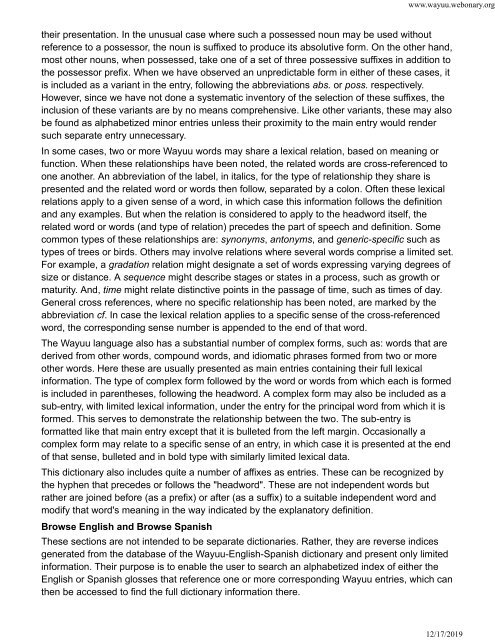You also want an ePaper? Increase the reach of your titles
YUMPU automatically turns print PDFs into web optimized ePapers that Google loves.
www.wayuu.webonary.org<br />
their presentation. In the unusual case where such a possessed noun may be used without<br />
reference to a possessor, the noun is suffixed to produce its absolutive form. On the other hand,<br />
most other nouns, when possessed, take one of a set of three possessive suffixes in addition to<br />
the possessor prefix. When we have observed an unpredictable form in either of these cases, it<br />
is included as a variant in the entry, following the abbreviations abs. or poss. respectively.<br />
However, since we have not done a systematic inventory of the selection of these suffixes, the<br />
inclusion of these variants are by no means comprehensive. Like other variants, these may also<br />
be found as alphabetized minor entries unless their proximity to the main entry would render<br />
such separate entry unnecessary.<br />
In some cases, two or more <strong>Wayuu</strong> words may share a lexical relation, based on meaning or<br />
function. When these relationships have been noted, the related words are cross-referenced to<br />
one another. An abbreviation of the label, in italics, for the type of relationship they share is<br />
presented and the related word or words then follow, separated by a colon. Often these lexical<br />
relations apply to a given sense of a word, in which case this information follows the definition<br />
and any examples. But when the relation is considered to apply to the headword itself, the<br />
related word or words (and type of relation) precedes the part of speech and definition. Some<br />
common types of these relationships are: synonyms, antonyms, and generic-specific such as<br />
types of trees or birds. Others may involve relations where several words comprise a limited set.<br />
For example, a gradation relation might designate a set of words expressing varying degrees of<br />
size or distance. A sequence might describe stages or states in a process, such as growth or<br />
maturity. And, time might relate distinctive points in the passage of time, such as times of day.<br />
General cross references, where no specific relationship has been noted, are marked by the<br />
abbreviation cf. In case the lexical relation applies to a specific sense of the cross-referenced<br />
word, the corresponding sense number is appended to the end of that word.<br />
The <strong>Wayuu</strong> language also has a substantial number of complex forms, such as: words that are<br />
derived from other words, compound words, and idiomatic phrases formed from two or more<br />
other words. Here these are usually presented as main entries containing their full lexical<br />
information. The type of complex form followed by the word or words from which each is formed<br />
is included in parentheses, following the headword. A complex form may also be included as a<br />
sub-entry, with limited lexical information, under the entry for the principal word from which it is<br />
formed. This serves to demonstrate the relationship between the two. The sub-entry is<br />
formatted like that main entry except that it is bulleted from the left margin. Occasionally a<br />
complex form may relate to a specific sense of an entry, in which case it is presented at the end<br />
of that sense, bulleted and in bold type with similarly limited lexical data.<br />
This dictionary also includes quite a number of affixes as entries. These can be recognized by<br />
the hyphen that precedes or follows the "headword". These are not independent words but<br />
rather are joined before (as a prefix) or after (as a suffix) to a suitable independent word and<br />
modify that word's meaning in the way indicated by the explanatory definition.<br />
Browse <strong>English</strong> and Browse <strong>Spanish</strong><br />
These sections are not intended to be separate dictionaries. Rather, they are reverse indices<br />
generated from the database of the <strong>Wayuu</strong>-<strong>English</strong>-<strong>Spanish</strong> dictionary and present only limited<br />
information. Their purpose is to enable the user to search an alphabetized index of either the<br />
<strong>English</strong> or <strong>Spanish</strong> glosses that reference one or more corresponding <strong>Wayuu</strong> entries, which can<br />
then be accessed to find the full dictionary information there.<br />
12/17/2019


















